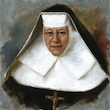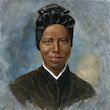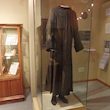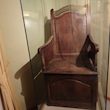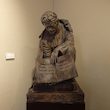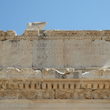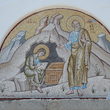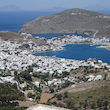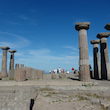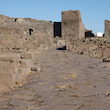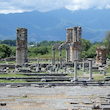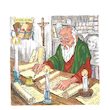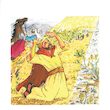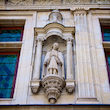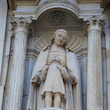Saint Flannan (d.642)
Saint Flannan was the son of an Irish chieftain and next in line for the throne. Flannan feared becoming king, and prayed for a disfigurement that would prevent his ascension to the throne. After his prayer, his face became inflamed …
Saint Jose Manyanet y Vives (1833-1901)
Saint Jose Manyanet y Vives was born into a large, religious family. He was dedicated to Our Lady at the age of five by his mother, and was ordained into the priesthood several years later. Jose founded the Congregation of …
Saint Adelaide (931-999)
Saint Adelaide married King Otto of Germany after her first husband passed away. After Otto's death, Adelaide had a rocky relationship with her son, Otto II, most likely due to the hateful nature of his wife, Theophano. When Otto II …
Saint Mary Di Rosa (1813-1855)
Saint Mary Di Rosa was born in 1813, and began to take charge of situations from the time she was a young girl. She set up retreats and missions for her parish, arranged a women's guild, and supervised a workhouse …
Saint John of the Cross (c.1541-1591)
Saint John of the Cross, a 16th-century mystic, was responsible for reforming the Carmelite Order. He was a person who lived an austere life, renouncing many of the things of the world. John was a man of intense prayer who …
Saint Lucy (c.283-c.304)
Saint Lucy is a beloved saint in Rome and Sicily. She died a martyr around the year 304. She gave herself totally to Christ in all things. The reading for her feast points to pure speech and service to the …
Saint Jane Frances de Chantal (1572-1641)
Saint Jane Frances de Chantal was born into a noble family and married the Baron de Chantal when she was 20. They enjoyed a fruitful marriage and had several children. Tragically, the baron was killed in a hunting accident when …
Saint Damasus I (c.305-384)
Saint Damasus I was appointed pope after the death of Pope Liberius. However, a minority in Rome appointed another man, Ursinus, as pope. This caused a controversy that resulted in violence and scandal. During the papacy of Damasus, Christianity was …
Saint Gregory III (d.741)
Saint Gregory III was not intending on taking over the papacy when Saint Gregory II passed away. He was part of the crowd that was mourning the loss of the pope during his funeral procession, when someone recognized him as …
Saint Juan Diego (1474-1548)
On December 9, 1531, a 57-year-old peasant named Juan Diego, who lived near Mexico City, was on his way to Mass. Suddenly he heard beautiful music and a woman’s voice calling to him from Tepeyac Hill. At the top of …
Saint Romaric (d.653)
When Saint Romaric's father was killed on the orders of Queen Brunehilda, the young boy became a homeless nomad. With time and hard work, Romaric's luck changed. He amassed a great fortune and was a landowner with many slaves. Romaric …
Saint Ambrose (c.340-397)
Those who knew Saint Ambrose were divided between those who admired him and those who loathed him. This division stemmed from Ambrose's personality and how he practiced his ministry. Ambrose would publicly do verbal battle with anyone, even people of …
Saint Nicholas (d.346)
Saint Nicholas was a bishop, and bishops are often referred to as the shepherds of the people of God in the Church. Accounts credit Saint Nicholas with saving the lives of three daughters who were destined for prostitution because their …
Saint Sabas (439-532)
Saint Sabas was left in the care of his aunt and uncle as a child. His aunt treated him so wickedly that he ran away to live with another uncle when he was only eight years old. These two uncles …
Saint John Damascene (645-749)
Saint John was born in Damascus. He and his adoptive brother Cosmos received a classical and theological education. Both brothers joined the Monastery of Saint Sabas near Jerusalem. John is well known in three areas. First, he is known for …
Saint Francis Xavier (1506-1552)
Saint Francis Xavier was born to a noble family of the Kingdom of Navarre in what is modern-day Spain. Giving up a promising career as a professor of philosophy, he joined Saint Ignatius of Loyola to become one of the …
Saint Bibiana (d.361)
Saint Bibiana was a virgin and martyr. Very little is known about her life, except what we know from a later tradition. Her parents, Saints Flavian and Dafrosa, were martyred during the persecution of Julian the Apostate. Bibiana and her …
Saint Edmund Campion (1540-1581)
Saint Edmund Campion was born in London, England. He was extremely bright, and was given a scholarship to Saint John's College, Oxford, when he was only 15 years old. Edmund was raised a Catholic, but chose to become an Anglican …
Saint Andrew (1st century)
Matthew tells us that Andrew was a fisherman, along with his brother Peter. In the Gospel of John, we learn that Andrew was also a disciple of John the Baptist (see 1:40). With John the Baptist, Andrew was waiting for …
Saint Radbod (d.918)
Saint Radbod lived a very quiet and holy life. He was the grandson of the last pagan king of the Frisions in the Netherlands. Radbod was raised and educated by his uncle, the bishop of Cologne. He became the bishop …
Saint James of the Marche (1391-1476)
Saint James was born in the Marche of Ancona in Italy. He attended the University of Perugia, where he attained doctorates in canon law and civil law. After he earned his degrees, he felt called to join the Franciscans and …
Saint Francesco Antonio Fasani (1681-1742)
Saint Francesco Antonio Fasani was born in Lucera, Italy. He was a very devout child and entered the order of Conventual Franciscans, taking the name Francis. He was ordained 10 years later and taught philosophy to younger friars in the …
Saint Conrad (d.975)
Saint Conrad was born into a prominent Guelph family. He received an education at the Cathedral School at Constance and was ordained a priest. Conrad was appointed provost of the cathedral and was then selected bishop of Constance. He was …
Saint Catherine of Alexandria (d.305)
Saint Catherine is thought to have been born in Alexandria to a noble family. She converted to Christianity after she had a life-altering vision. Catherine criticized Emperor Maxentius for his persecution of Christians. In an attempt to sway Catherine away …

